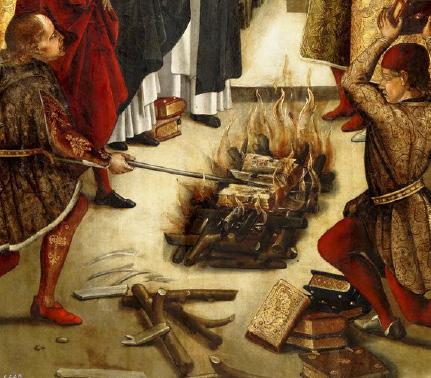
2 minute read
Should books be censored?
By Clara Johnson
What better to talk about other than one of the most dogmatic, ambivalent inscrutable topics of the Century?
Advertisement
Starting off with the big scary word at the top of the page: censorship. To censor something is 'The
suppression or prohibition of any parts of books, films, news, etc. that are considered obscene, politically
unacceptable, or a threat to security.' according to the Oxford Dictionary. To think that censorship has been around since 213 BCE, when the Chinese Emperor Qin Shi Huang buried 460 scholars for the power of his kingdom alive IS kind of scary.
Image: St. Dominic and the Albigenses, Pedro Berruguete For books on the other hand, censorship has undoubtedly been lurking around ever so quietly in the dark alley ways of publishing. Whether it be for the censorship of new ideas that challenge religious thought, e.g. Charles Darwin's Origins of Species (published in 1859) or the infamous reign of Nazi Germany, where burning books was 'cleansing' for literature and was done through public festivals to celebrate the bonfires, it is hard to deny its ever-lasting impact. In the modern world, we are witnessing the improvement of accepting different opinions... we hope!
As for the year 2020, it has proven to be one for the history books with the BLM movement, LGBTQ+ rights campaign and people being brought together through the pandemic. Indeed, reading has also been something of which many of us had finally found the time for. So what does this mean for censorship? Does it still occur today? The simple answer is unfortunately, yes. Censorship although on a smaller scale, still happens today. For instance, the beloved Harry Potter Series by J.K Rowling, has been seen as a genuine threat to devoted religious groups who are opposed to 'black magic'. The article "A surprising list of recently banned books" by Matt Blake states that in September 2019 St Edward Catholic School in Nashville, US, banished this book from their library due to discomfort of magic. Emails were sent to the parents as the school which depicted it as 'a clever deception'. I will leave it up to you to decide if you think it is Rowling's darkest desire to convert the youth into wizards and witches (personally, I think we need more of them). Nevertheless it beckons the question of whether we censor what people read? Maybe we should if it is a threat to children. For example, we probably shouldn't let them read 50 Shades of Grey by E. L. James, or American Psycho by Bret Easton Ellis. From a personal experience maybe I should've left Mein Kampf by Adolf Hitler on the shelf when I was 10 years old... But back to the burdening question: should books be censored? Should avid readers choose from a wide selection of books that challenge society's normality? Or let others pick and choose for you, narrowing your quest for discovery short?
In order to challenge this superfluous idea of censorship, I strongly advise you to read anything and everything. You should never feel the need to suppress the exploration of new ideas or authors, you should never avoid a book due to its controversial topic; give every opportunity to discovering through literature no matter what anybody tells you. Feel free to take that beyond the realm of books too!










